I remember challenging a friend of mine when she put a post on Facebook a few years ago about how proud she was that her twin 16 year old boys were going to help build an orphanage in Uganda for a month during their school holidays. They were trying to fundraise for the trip, thus the Facebook post, the target amount being £4000. Or £8000 for twins.
Their post had photos of Ugandan children being hugged by 17 year old Londoners and so, at first glance I thought they were raising money to help fund the orphanage. But it didn’t take long to realise that they were actually fundraising to pay for a holiday. A four week volunteering holiday for school children in Uganda, ten days of which was to be spent helping paint a wall or two, giving an English class and playing football with local children. The rest was for the ‘volunteers’ to go on safari, as well as six beach “chill out” days and, if we wanted to ‘fund raise’ for the optional extras, getting their PADI course and summiting Mount Kenya.
Controversially, I chose not to ‘like’ her post and, in addition, made that ultimate faux pas of questioning her. Which, needless to say, didn’t go down well with the mum. But are volunteering holidays for school children ethical?
Should school children go on volunteering holidays?
My friend’s main argument was, at the end of the day, this was a fantastic experience for her boys. I couldn’t argue with that one. And that the trip would, according to the travel company that sold the holiday through the school, get them 70 UCAS points (Universities and Colleges Admissions Service) for their university applications. I bit my lip.
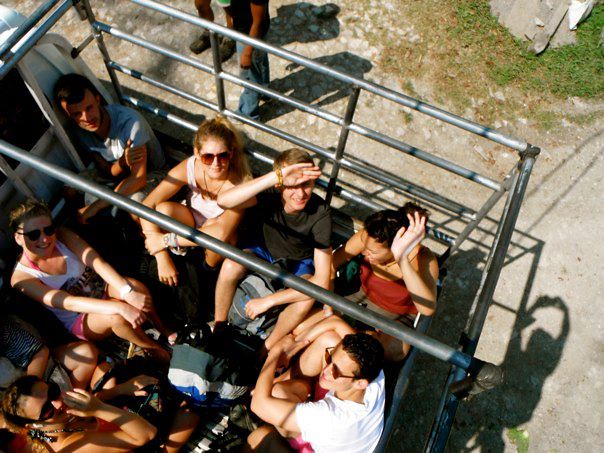
Recently, as my own son’s year group was about to be sold the same shenanigans. I am glad to say that he is old enough to agree with my challenges, as below, which still remain the same. If you agree with them, I ask that you spread the word to geography, science or heads of year teachers who are somehow buying into the notion that these are ethical holidays that make a difference to those on the ground, but also to other parents who might be considering handing over thousands of pounds. The choice is theirs of course, but perhaps just think outside the box a little before starting the cake sales:
- How can it possibly benefit a small community in Uganda (or many other places that have projects waiting for 17 year olds to fix) having school children paint their walls, play football with the children and so on, when there are expert NGO’s there already working round the clock to break the poverty cycle? As well as, in many cases, expert local and international adult who are qualified to do the job. Or could be trained by experts to do so.
- Would you want a group of unknown seventeen year olds coming into town to take over your children’s education and building projects without any sort of vetting or professional expertise? And then be hugged by them to be spread all over Instagram, #volunteer #love #awesome
- Why are young people put under huge pressure to ‘fundraise’ for something that isn’t a charity? These are profit making holiday companies that throw a bit of community work into the package because ‘doing good’ sells.
- Why would UCAS favour young people who have paid £4000 for some UCAS points? (see more below, but quick answer is – they don’t)
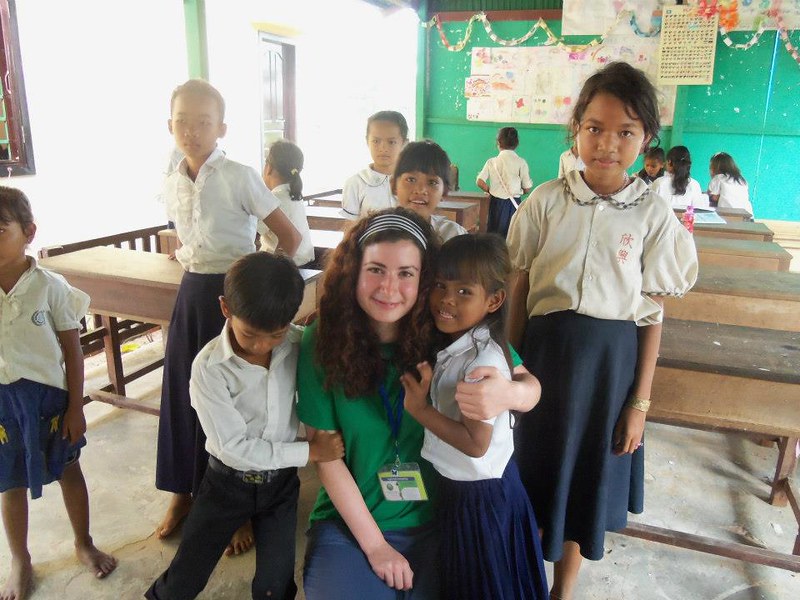
Mis-sold, mis-treated and mis-informed
What stands out for me, however, in the case of volunteering holidays that are being targeted at school children, is that young people are being mis-sold, mis-treated and mis-informed. Mis-sold because the reality is that these aren’t ‘do good’ volunteering trips that are all about charity. They are holidays. With companies making a lot of profit out of them.
Give even half of your fundraising directly to a grass roots charity on the ground, and see what they can do with it. They would build a lot more than a wall, or paint a classroom. Mis-treated, because education is competitive enough at 17, without young people being pressurised to raise £4000 to keep up with their friends. And mis-informed because these trips do NOT guarantee extra points towards university.
The UCAS point of view
Having just embarked on my own UCAS journey and university open days with my son, not one of university said ‘you know what, go and build a wall in Africa for £4000, and the deal is sealed.’ What they do suggest, is get involved in your own local community, political or social justice groups – now that would be interesting. Oh, and study.
To clarify, I spoke with UCAS about this issue of volunteering holidays being a way to gain university points. Ben Jordan, Senior Policy Executive at UCAS:
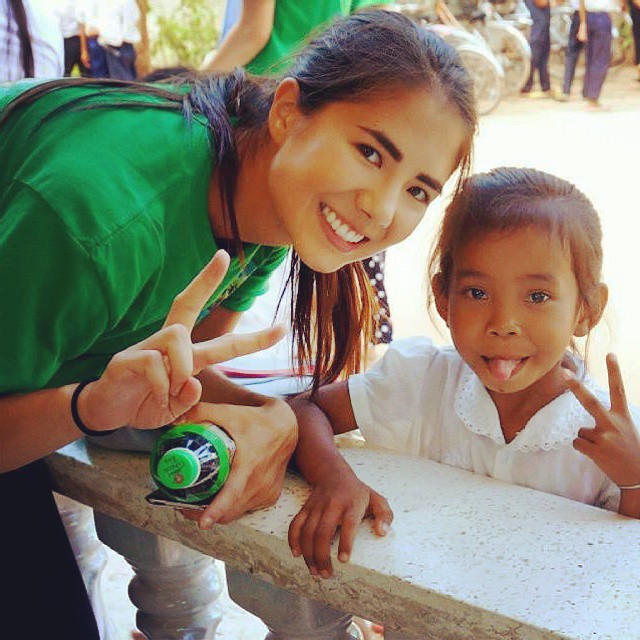
“Volunteering holidays in themselves do not attract UCAS Tariff points. However, some volunteering programmes may offer an accredited qualification as part of it. For example the ASDAN award is an accredited Level 3 qualification that can be delivered through such programmes. But, far away volunteering breaks aren’t the only way to achieve such a qualification and they can be delivered more locally.
It’s important to remember that although the above qualifications are recognised in skills development by some, not all universities will accept them as suitable for entry and not all institutions use the UCAS Tariff points system. Therefore it’s vital that students research the claims of such programmes properly and look into the requirements of the universities and courses they’re interested in.
What anyone applying to study should be aware of, is that universities take a wide range of factors into consideration when recruiting students. This includes grades, relevant experiences relating to their chosen course and their personal statement. Universities are also aware that it won’t be possible for all people to engage with such volunteering programmes, therefore no learner would be disadvantaged by not attending.”
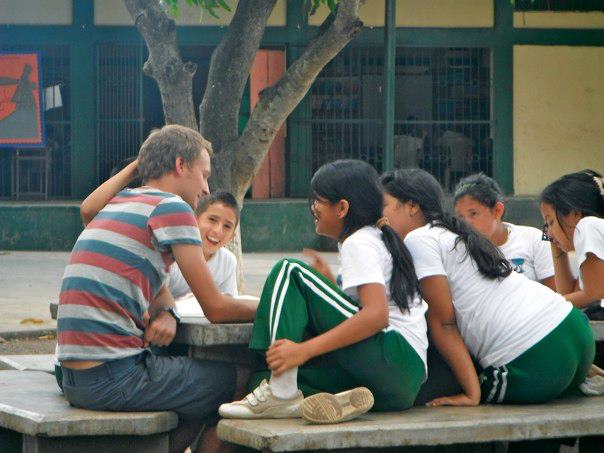
The children who don’t have a choice
Most importantly, however, in this debate is that children being sold these volunteering holidays have a choice whether to go or not. The children who don’t have a choice are those in the destinations where our seventeen year olds are going to spend time. And this is where the companies that promote themselves as selling ethical school expeditions must really be held to account. Do they adhere to strict responsible tourism guidelines when it comes to working with young school children abroad? What child protection policies do they have in place? Do they seek qualifications or at least some experience from those people paying to volunteer if they are going to be teaching or caring for young people abroad?
I contacted various expedition companies that target pre university young people to get their feedback on this subject, and to get more details on their ethical policies. One example is Frontier. One of their projects – “Teaching and Beaches” – involves working in schools in Thailand, where on a volunteering holiday between one week, school children can “help the (local) students broaden their minds.” The trip highlights are described as both “(making) a difference to the lives of disadvantaged children” and “(hitting) the beach with you (sic) colleagues!” It is worth noting that such a trip can be as short as one week, hardly enough time to make any difference. At date of publication, I had no reply or feedback from Frontier.
I am not a lone voice in this belief, however, with a lot of experts trying to get the message across about how volunteering in orphanages can actually have a damaging impact on children and their communities – despite whatever good intentions are involved. See Save the Children’s excellent advice on the subject as well as responsibletravel.com.
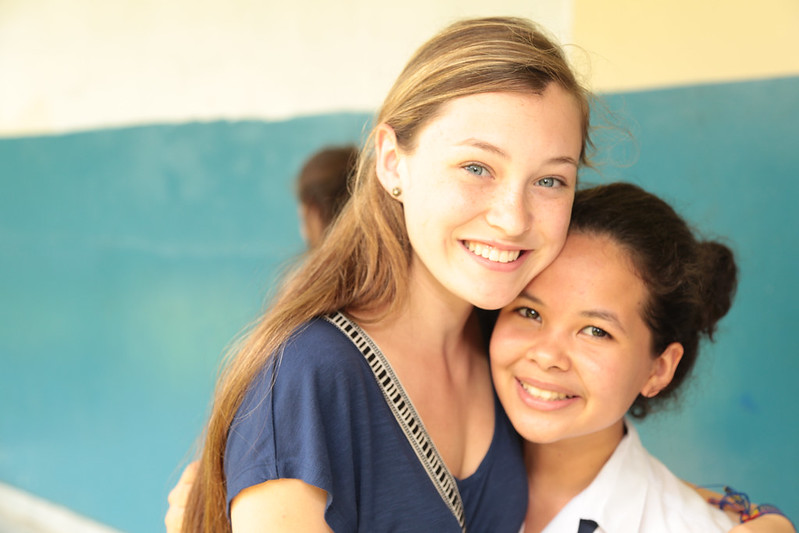
Ethical volunteering guidelines are a must
For a truly ethical volunteering holiday, ethical guidelines must be followed. You can see examples of these here on responsibletravel.com. In my view, a truly ethical volunteering holiday will place the needs of a community first. And, although I know my seventeen year old would do his bit if he went to Uganda, I also know that he will not be making real difference to a child’s life there. Nor will he make a big difference to his university application.
My main hope with this blog is to spread the word among schools and parents about volunteering holidays for school children. Please question these £4000 trips. Demand transparency when you go to the sales talks. How much profit is being made from these trips? Can schools really justify this concept of ‘fund raising’ which is no more than a profit making exercise? Teachers and parents should question if they would want unqualified, unvetted people coming into their children’s school when they were four years old. They should ask the volunteering holiday companies about the details of their projects. How many walls are being built? When was the last wall built? Are there no builders that can be employed in Uganda or Peru? And, most importantly, and controversially, will the company vet and police check their children before going out there? Oh, and please post this on Facebook.
Photo Credits: top to bottom, from Flickr Creative Commons , First five images: FrontierOfficial, and 6th image AFS

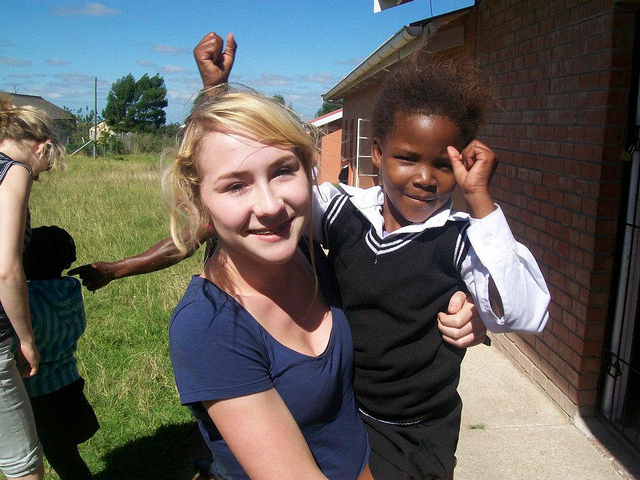
Thanks for this well researched post Catherine – universities and schools must take responsibility for the “products” they promote to their students. The good news is that universities led by LSE are beginning to get it – take a look at those Unis that have pledged not to promote orphanage volunteering – and any students who read this get your Uni or school to make the same pledge…..please http://bettervolunteeringbettercare.org/
Very sad to see that despite your ‘research’ you still remain massively ignorant about what these trips entail and what they can bring to rural communities and underprivileged children living in hardship. Perhaps if you had been on one yourself then you might be better placed to comment. Very offended by your largely inaccurate and misguided article.
This is an excellent article, and I will be sharing it on Facebook. My daughter is also 17, and was encouraged to take part in one of these trips with her school after GCSEs, to Malawi. She didn’t go, for the reasons which you have outlined, but I know that she feels that she missed out by not going when so many of her peers did. I hope that schools will come to realise the harm of such trips.
Many thanks for your comment Nicola. Thankfully these trips weren’t on offer when I was seventeen, so no I have not been on one. In terms of research, I am am pretty confident that I aware of ethical guidelines when it comes to volunteering holidays with young, vulnerable children, as I have completed a Masters in Responsible Tourism and have met with many practitioners in this area, from Tourism Concern, ECPAT, Better Care Network, Responsible Travel to People and Places Volunteering. All experts in this field. And also UCAS, with whom I talked in detail. I have also attended several seminars on the subject and, as a travel writer I have travelled extensively. I have volunteered in this country but not abroad, although when my children leave home I certainly hope to spend some time volunteering for an extensive period of time. Probably in Kenya where I have spent time with the Maasai, and I hope to go back and visit, supporting projects run by Tribal Voice Communications. Or else with responsible volunteering organisation People and Places, who do vet their volunteers thoroughly, and do a detailed match of skills to projects. I don’t doubt for a second that young people who go on these trips have a wonderful time, are fulfilled and inspired, contribute whole heartedly and many may continue to work in this field or contribute to relevant charities. But I do doubt the sales pitch that is used in many cases to persuade young people and their families or carers to hand over such vast amounts of money. I doubt the pressure they are put under to ‘fundraise’. And I doubt the transparency of the companies selling the trips. That was the point of the article, so I am sorry if I have not made that clear. I also stand by my view that we should not expect local communities to welcome strangers into their homes and schools to work with young vulnerable children. They should be vetted and police checked, for the same reasons that they are in this country, and other countries in the west. My intention was never to offend with the article. Merely to heighten awareness of the issues. Catherine
Many thanks Gretta. I hope you will share the article with your daughter, and that she will have an opportunity to volunteer at a later date, for a longer period of time, and in a more ethical and sustainable way. Cheers, Catherine
Well put Cathy. The whole voluntarism industry needs to be regulated. Some if the biggest tour operators seem to fail to understand that offering volunteering is unethical. It is often unclear where the money is going. Young people who volunteer in orphanages in Asia may be surprised to discover that the money they pay for the trip goes into a huge corporate pot not to the children they feel they are helping. I hadn’t realised schools are also guilty.
Thanks Susan – there is a lot of work going on to regulate the volunteering industry, with organisations like People and Places Volunteering, who have commented here, leading the way with international new guidelines etc. I really want to stress that there are a lot of great companies making important contributions to the world out there. But there are also a lot of dodgy players out there. And the schools volunteering sector is often upstaged by the ‘gap year’ players. Which is why I chose to highlight this area and hope to write about it more in the future. Cheers, C
Hi Catherine,
Another great article – thank you. It highlights so many valid points. As the director of a school tour operator arranging tours and expeditions – including volunteer projects – there are various points worth of comment. In no particular order:
Fundraising: You’re spot on – the vast majority of the money goes towards the logistics of the trip, not the project, and transparency on this is very important when selling the trip to students and parents. We separate out the project costs from the ‘trip’ costs to help with this. However, fundraising is an important part of these trips. If students work hard to make it happen, they get a lot more out of the experience. The crucial bit -though, is that fundraising needs to be done ethically too. When the majority of the trip costs are logistics, it’s NOT ok to simply ask for ‘donations’ to help ‘fix Uganda’ – which I think is where you issue lies. Entrepreneurial money making though (e.g. cake sales, car washing, quiz nights etc) – i.e. when the ‘donors’ are getting something for their money, is OK I believe. The students are effectively being paid to supply a service. Planning such activities also teaches them business skills and financial planning.
UCAS points. Undertaking a trip simply to get UCAS points is missing the whole point I think. Travel, particularly in the developing world, is hugely educational – it can completely change a young person’s perspective of the world, and as such, I believe they should be encouraged – so long as the trips are responsibly run. Students can gain valuable experiences which can then set them aside from other candidates during university applications.
Type of projects undertaken: Personally, I really struggle with the whole notion of volunteering abroad – for many of the reasons you highlight (see also my “Africans, Orphans and Kilts” blog: https://www.thestc.co.uk/blog/africans-orphans-and-kilts). We don’t offer project work in every destination and we certainly don’t offer orphanages or working with children. It is difficult to find good volunteer projects. We also try and get everyone to be realistic about what can be achieved in a 3 – 7 day project. That said, some volunteer projects can be beneficial to all concerned so long as they are driven by the local community and based on mutual respect, rather than treating the developing world as something that we need to ‘fix’.
Costs: Yes, companies like ours aim to make profits. But… all school tour operators are also taking on a lot of responsibility and workload in planning, arranging and operating these trips. It is our name on the line if something should go wrong and so things need to be planned properly with minute attention to detail and a comprehensive approach to safety. Unfortunately, that doesn’t come cheap. It’s not simply the case of booking some flights and ground arrangements and waving a group on their way. Some trips offered by some school expedition companies are eye-wateringly expensive and totally unjustifiable in our view. Some trips are expensive because the itinerary logistics are costly, yet that doesn’t necessarily justify trying to sell them to schools. Cheaper trips are possible and the learning outcomes on a 25 day expedition to Morocco at £1,800 are broadly similar to 25 days in the Indian Himalaya at £3,400. The destination is often guided by where teachers and students want to go.
In summary, what I’m trying to say is, not all school expeditions are bad. Some in the industry are making conscious efforts to offer a more sustainable and ethical model, through better volunteering, using only leaders from the destination (not UK leaders) and educating students in the issues of Responsible Tourism.
Thanks again for highlighting the issues with a great article. Keep up the good work Catherine!
Adrian Ferraro
Many thanks for taking the time to reply in such detail, Adrian and updating us with your vast experience. It is good to see that some school providers are thinking it through in detail, and here’s hoping that this blog will direct schools away from the obvious hard sellers, to other options out there. I would really like to see a bigger debate on this at somewhere like WTM or ITB in the near future, as I really think that travel at this age has massive potential. I see it in my own seventeen year old son. I also take on board the point about fundraising and how useful that is for young people, as long as they don’t get their parents to do it all for them, as can happen, because they just get too overwhelmed with all the work they have to do too. (Coming from one who has made too many cakes in her day!) Cheers, Catherine
Thanks Catherine, I agree – a debate on this, and a general increase in the profile of ALL aspects of responsible tourism would be very welcome in the schools market. I think the industry is currently missing an massive opportunity to educate young people about the significance of the issue. Regarding the fundraising, it is very much a balance. We have some children raise all the funds themselves, others less so. We try and encourage a bit of ‘bartering’ between parents and children to come to an agreement over how much each is going to contribute (it stands the students in good stead for those markets overseas too!) Thanks again.
This is such a great piece so on point. An eye opener for all parents out there.
A lot of the proceeds from these fundraisings ends up in the wrong hands. It is our duty and responsibility to stop falling for these traps. Very happy to see someone like you writing about such issues in our society and also being able to offer great alternatives.
Regards,
Jacky
Dear Cathy,
Thank you so much for this brilliant article. The hard sell of these organisations continues with the additional caveat of asking students in year 10 to pay a non-refundable downpayment early on (hundreds rather than thousands initially) so that they have 15 months to fundraise the rest. I was able to use this article to help parents dissuade a young person from signing up as, at the brilliantly sale pitch of the company, which was recently hosted by our school, the fundraising seems so feasible. That’s a major driving method of this mis-selling, the fact that our kids are loved young people and may well be able, with their parents’ help, to fund-raise to support these unethical and expensive holidays, sold under false pretenses.
Thank you so much,
Donatella
Glad you found it useful, Donatella. And do please feel free to share on your social media outlets.
Hi Catherine
I do think this is a great article which all parents and students considering these types of trips should read. However, I would just like to add an update from the perspective of someone who has been organising school expeditions on the ground in at least 20 countries for nearly 12 years.
I believe that Adrian, above, has addressed the fundraising and UCAS points issues and raised the point that no family should be using the volunteering aspect of the trip as a way of raising the funds.
In terms of the word “holiday”, I would like to add the school expeditions industry grew from the ambitions of teachers and youth leaders to give students of school age a significant developmental experience outside the classroom. This underlying educational goal remains at the heart of each trip. This ethos means that alongside the pre departure fundraising programme the students are required to pitch in and lead the trip themselves, taking responsibility for everything from booking accommodation to managing the budget to risk assessment. They are of course led from behind by qualified staff who are closely monitoring the safety aspect of each day. The majority of parents and teachers involved observe that the development opportunities which come from this are invaluable. That is not to say though that similar opportunities could not be found in cheaper activities closer to home, only that the exposure to vastly different cultures and being forced to operate outside their comfort zone intensifies the experience.
I would also like to comment on the volunteering issue. You are absolutely right about the “painting a wall” type of projects, about orphanage tourism and about the “saving the world attitude”. Whilst 10-15 years ago these would have been typical of the volunteering part of many trips, the large company I work for, and the industry itself has changed and adapted in line with current thinking and knowledge.
We almost at the end of a long process of withdrawing from orphanage projects, but this in itself, of course, has to be managed in a sustainable manner. Many orphanages around the world relied on the funds these groups brought with them, even if we now know that short term interaction with streams of foreign visitors was not in their best interests. We have employed an expert in the area of orphanage tourism to advise us and guide us through this process.
Whilst it is true to say that an unskilled teenager cannot alone do much to help break the cycle of poverty in the developing world, groups of unskilled teenagers at a well managed and planned project can, with the help of paid local skilled labour, build a whole school where none existed previously and without government funds would ever be built. Groups can also build other essential community infrastructure or at the very least make a huge positive impact on the learning environment of children in remote schools with little in the way of materials.
The cultural exchange and community engagement which results from foreign volunteers should also not be underestimated and this benefits both parties. Very often it is the case that even the presence of groups of foreign children will increase the long term attendance at any given school by a large percentage, and equally as importantly will often sew the seeds of academic ambition in local children who previously did not think beyond their local village.
Nowadays most of the better school expedition companies work with local NGOs in each country, and so the tasks that are completed are community driven and projects responsibly sourced. These NGOs welcome even the small help that school groups can bring to them, the funds, the hard labour and the cultural exchange aspect. In some countries, school groups can also work with larger NGOs on projects such as building houses for Habitat for Humanity.
Whilst on a personal level I do not wish to make a profit from the development of young people, as Adrian points out, to enable young people to have these experiences in often remote corners of the world a robust safety and back up system is essential and this costs more than you would imagine.
I do not doubt that school expedition companies have a long way to go in terms of responsible travel, however there is certainly a wave of positive change in the industry. Thank you again for your thought provoking article.
Caroline Joyner
Many thanks for taking the time for this informative response. And apologies for my delay in replying and publishing. This is certainly an area worthy of much debate in the future, and your input is invaluable. Very best, Catherine